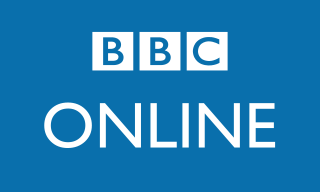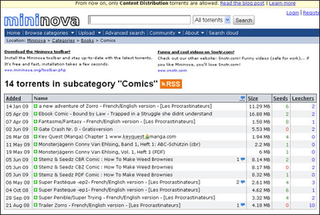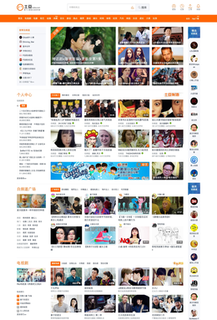
TiVo Corporation, formerly known as the Rovi Corporation and Macrovision Solutions Corporation, was an American technology company. Headquartered in San Jose, California, the company is primarily involved in licensing its intellectual property within the consumer electronics industry, including digital rights management, electronic program guide software, and metadata. The company holds over 6,000 pending and registered patents. The company also provides analytics and recommendation platforms for the video industry.

BBC Online, formerly known as BBCi, is the BBC's online service. It is a large network of websites including such high-profile sites as BBC News and Sport, the on-demand video and radio services co-branded BBC iPlayer, the children's sites CBBC and CBeebies, and learning services such as Bitesize. The BBC has had an online presence supporting its TV and radio programmes and web-only initiatives since April 1994, but did not launch officially until 28 April 1997, following government approval to fund it by TV licence fee revenue as a service in its own right. Throughout its history, the online plans of the BBC have been subject to competition and complaint from its commercial rivals, which has resulted in various public consultations and government reviews to investigate their claims that its large presence and public funding distorts the UK market.
Nick.com is a website owned and developed by Nickelodeon. The website previously served as an online portal for Nickelodeon content, and offered online games, video streaming, radio streaming and individual websites for each show it broadcasts. It now promotes the Nick mobile app which replaced it. Nick.com has received positive critical reaction and various awards, including a Webby in 2003. Positive praise has also been received because of the steps taken by the website to protect user privacy. Visits to the domain outside the United States are redirected to YTV in Canada or to the domestic network site of the visiting IP's nation or region due to programming licensing issues between territories.
Google AdSense is a program run by Google through which website publishers in the Google Network of content sites serve text, images, video, or interactive media advertisements that are targeted to the site content and audience. These advertisements are administered, sorted, and maintained by Google. They can generate revenue on either a per-click or per-impression basis. Google beta-tested a cost-per-action service, but discontinued it in October 2008 in favor of a DoubleClick offering. In Q1 2014, Google earned US$3.4 billion, or 22% of total revenue, through Google AdSense. AdSense is a participant in the AdChoices program, so AdSense ads typically include the triangle-shaped AdChoices icon. This program also operates on HTTP cookies. Over 11.1 million websites use AdSense.
Technical communication is a means to convey scientific, engineering, or other technical information. Individuals in a variety of contexts and with varied professional credentials engage in technical communication. Some individuals are designated as technical communicators or technical writers. These individuals use a set of methods to research, document, and present technical processes or products. Technical communicators may put the information they capture into paper documents, web pages, computer-based training, digitally stored text, audio, video, and other media. The Society for Technical Communication defines the field as any form of communication that focuses on technical or specialized topics, communicates specifically by using technology or provides instructions on how to do something. More succinctly, the Institute of Scientific and Technical Communicators defines technical communication as factual communication, usually about products and services. The European Association for Technical Communication briefly defines technical communication as "the process of defining, creating and delivering information products for the safe, efficient and effective use of products ".

Myspace is an American social networking service. From 2005 to 2009, it was the largest social networking site in the world, reaching more than 100 million users per month.
TV.com is a website owned by CBS Interactive (ViacomCBS). The site covers television and focuses on English language shows made or broadcast in Australia, Canada, Ireland, Japan, New Zealand, the United States, and the United Kingdom. It emphasized user-generated content. Australia and UK versions of the website are also available, at au.tv.com and uk.tv.com, respectively.

Discovery Digital Networks was a San Francisco based multi-channel Internet television and digital cable network that created, produced and distributed Web television shows on niche topics. It was sold by Discovery Communications into Group Nine Media in December 2016 and, as such, no longer exists.

YouTube is an American online video-sharing platform headquartered in San Bruno, California. Three former PayPal employees—Chad Hurley, Steve Chen, and Jawed Karim—created the service in February 2005. Google bought the site in November 2006 for US$1.65 billion; YouTube now operates as one of Google's subsidiaries.

User-generated content (UGC), alternatively known as user-created content (UCC), is any form of content, such as images, videos, text, and audio, that has been posted by users on online platforms such as social media and wikis. It is a product consumers create to disseminate online product or the firm that markets it.

Mininova was a website offering BitTorrent downloads. Mininova was once one of the largest sites offering torrents of copyrighted material, but in November 2009, following legal action in the Dutch courts, the site operators deleted all torrent files uploaded by regular users including torrents that enabled users to download copyrighted material.
Naver is a South Korean online platform operated by Naver Corporation. It debuted in 1999 as the first web portal in Korea to develop and uses its own search engine. It was also the world's first operator to introduce the comprehensive search feature, which compiles search results from various categories and presents them in a single page. Naver has since added a multitude of new services ranging from basic features such as e-mail and news to the world's first online Q&A platform Knowledge iN.
Founded in 2001, SMS.ac Inc. is a mobile data and Internet communications company based in San Diego, California. With a worldwide connectivity to more than 400 mobile operators, the company offers a platform MMSbox for interpole exchange of MMS and SMS. The company has claimed to serve over 14 billion mobile text messages in 2003, and 25 billion in 2004 where they were widely criticized for charging unrequested SMS services from consumers and for failing to respond to the complaints of users and for FanBox's e-mail activities. The company provides distribution and billing to people buying and selling digital content through (SMS) mobile services and web-based applications. SMS.ac's website integrates its mobile billing technology with various social networking services like photos, videos, music, and comments. SMS.ac claims over 50 million registered users in more than 180 countries.

Blip was an American media platform for web series content and also offered a dashboard for producers of original web series to distribute and monetize their productions. The company was founded on May 5, 2005, and it was located in New York City and Los Angeles. It was financed by Bain Capital Ventures, Canaan Partners, and Ambient Sound Investments. Blip's mission statement was “to deliver the best original web series to audiences across multiple platforms.” The site showcased a wide variety of dramas, comedies, arts, sports and other shows. Blip was acquired by Maker Studios in 2013 and shut down by them on August 20, 2015.

Tudou, Inc. is a Chinese video-sharing website headquartered in Shanghai, China, where users can upload, view and share video clips. Tudou went live on April 15, 2005 and by September 2007 served over 55 million videos each day.
SciVee was a science video sharing website where researchers could upload, view and share science video clips and connect them to scientific literature, posters and slides from 2007-2015. The SciVee website is partnered with three groups: The Public Library of Science (PLoS), a publisher of a series of open access (OA) journals who have added content to the website, the National Science Foundation (NSF), who provided seed funding to start the website, and the San Diego Supercomputer Center (SDSC), who houses SciVee's video servers and data for the website. The University of California, San Diego-based service uses Adobe Flash technology to display video combined with documents and imagery via SciVee's patent pending rich internet applications (RIA) or "virtual studio" WYSIWYG to combine, or “synchronize” them with a published scientific article from a scientific journal or poster from a scientific conference poster session. Any video synchronized with a published scientific article is called a “pubcast,” while a video that is synchronized with a scientific conference session poster is called a “postercast.” Science videos that are not synchronized with a scientific article or poster can be uploaded and linked with supplementary files.
YouTube was created by three PayPal employees as a video-sharing website where users could upload, share and view content. The Internet domain name "www.youtube.com" was activated on Monday, February 14, 2005, at 9:13:12 p.m.

Live streaming refers to online streaming media simultaneously recorded and broadcast in real time. It is often referred to simply as streaming, but this abbreviated term is ambiguous because "streaming" may refer to any media delivered and played back simultaneously without requiring a completely downloaded file. Non-live media such as video-on-demand, vlogs, and YouTube videos are technically streamed, but not live streamed.
BroadbandTV Corporation is a Canadian media and technology company founded by CEO Shahrzad Rafati in 2005. The company is the second largest video property by unique viewers across the top 12 countries in the world, according to comScore, with head office in Vancouver, British Columbia, Canada.
An online video platform (OVP), provided by a video hosting service, enables users to upload, convert, store and play back video content on the Internet, often via a structured, large-scale system that may generate revenue. Users generally will upload video content via the hosting service's website, mobile or desktop application, or other interface (API). The type of video content uploaded might be anything from shorts to full-length TV shows and movies. The video host stores the video on its server and offers users the ability to enable different types of embed codes or links that allow others to view the video content. The website, mainly used as the video hosting website, is usually called the video sharing website.









